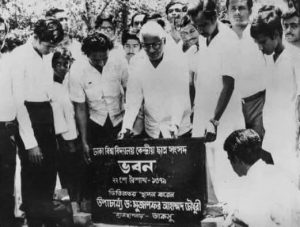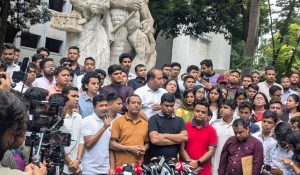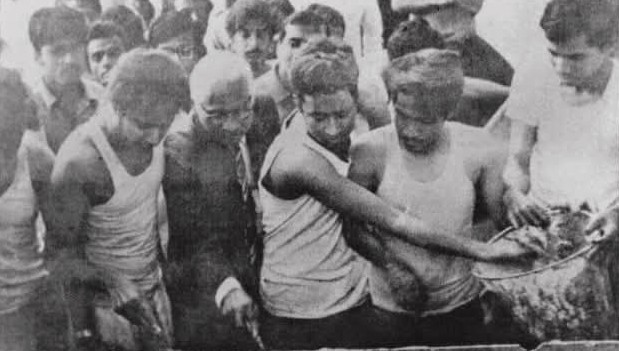In the post-July-uprising political landscape, the historic Dhaka University Central Students’ Union (Ducsu) has become the focal point of attraction for student organisations across the country. But why?
In the pre-independence era, Ducsu was referred to as the “command centre” of student politics or the “second parliament of Bangladesh.”
In a study published in the contemporary journal Shomaj, C Christiansen said, “Before and after January 1969, student leaders centered around Ducsu at Madhur Canteen strategised the 11-point movement.”
Ducsu was part of the All-Party Students’ Struggle Council, which organised the mass uprising against Ayub Khan. Even on March 2, 1971, when the first flag of Bangladesh was hoisted by ASM Abdur Rob, he was then the vice president (VP) of Ducsu.
Not only in the pre-independence period but also in post-liberation Bangladesh, Ducsu played a key role in shaping national politics. Leaders like Sirajul Alam Khan, Tajul Islam, and Abdur Razzak, who emerged from Ducsu, were part of the committee that drafted the constitution.

Thus, Ducsu is not just an organiser of movements but has also earned its place in history as a cradle of national leadership.
During the anti-Ershad movement in the 1980s, Ducsu remained a central force. After the self-immolation of Noor Hossain on November 10, 1987, Madhur Canteen became the epicentre of the anti-autocracy movement.
In 1989–90, Ducsu-led student coordination councils united national political parties, ultimately leading to the fall of Ershad’s regime.
However, after 1990, Ducsu’s influence and effectiveness gradually declined. Student organisations became divided, and violence increased. Under the shadow of national political parties, they lost their unique identity.
Meanwhile, the absence of regular Ducsu elections for 28 years weakened democratic practices on campus. When elections were finally held in 2019, they failed to meet expectations due to partisan influence and violence.
Consequently, the platform that once guided the nation’s political direction now hangs only in the frames of memory.
Sabir Ahmed, a teacher in the Department of Political Science at Dhaka University, reflecting on Ducsu’s past, told TIMES of Bangladesh, “In the pre-independence era, even though there was competition in Ducsu elections, there was a culture of coexistence among student organisations. Despite debates over position-sharing, there was a unique unity rooted in national consciousness.”
But times have changed. Instead of student-centric politics, Ducsu now reflects national politics. Sabir recalls Ducsu’s movements against the Sharif Education Commission of 1962 and the Majid Khan Education Commission of 1983. Although these were repealed due to intense movements, in his words, “Ducsu failed to propose new ideas or effective educational reforms for students.”
Explaining the deadlock in elections after the 1990s, he said, “The lack of dialogue and tolerance among student organisations is a key reason for the absence of Ducsu elections.”

Professor Abdur Razzak Khan of the Department of Mass Communication and Journalism at Dhaka University highlighted the differences between past and present political cultures in an interview.
He stated, “While left-leaning organisations had significant acceptance in Ducsu before independence, they are now increasingly marginalised.”
He also recalled post-liberation Ducsu VP Mujahidul Islam Selim’s efforts to revitalise DUCSU, which ultimately failed. Razzak Khan noted, “That committee could not stand by the students; instead, it drifted into national politics.”
Current scenario of Ducsu elections
In the post-2024 uprising political environment, this year’s Ducsu election holds special significance due to the votes of female students (almost half the university) and minority students. Students are considering the role of candidates during the July uprising and their personal image.
Thus, this election is not just about organisations but also about individual credibility and reputation.
Many students say that addressing fundamental issues like housing shortages, transportation, research environment, and campus security will be the key test for the elected committee. Additionally, they clearly demand an end to hall occupation and “shadow politics” in the name of student politics. They hope for a revival of student-centric democratic politics beyond traditional party dominance.
In this context, various student organisations and independent candidates have already announced their panels. The “United Student Alliance” of Islami Chhatra Shibir, “Ducsu for Change, Vote for Change” by the Student Rights Council, “Discrimination-Free Student Parliament” by the Democratic Student Union, new alliances of left-leaning student organisations, and the panel led by Umama Fatema are drawing attention. There is also an independent student unity panel.
Overall, a multidimensional political landscape has emerged around this year’s Ducsu election. Students believe that if promises are fulfilled, genuine democratic politics could return to campus. But if old party dominance and power struggles prevail, this initiative will remain merely a hopeful note.
Will Ducsu become a platform for students’ demands through this election? Or will it remain only a glorious past due to prolonged stagnation and political shadow? That is the question of the hour.


